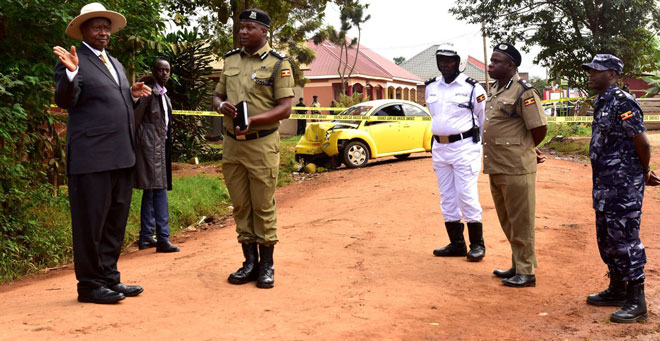
Kampala, Uganda | THE INDEPENDENT | The Directorate of Forensic Science (DFS) Uganda Police needs more than 2,000 scene of crime officers and exhibit analysts. According to Police records, there was a slight increase in crime reported in 2021 compared to 2020 standing at 196,081 and 195,931 respectively.
Andrew Mubiru, the Director says that much as the numbers of forensic scientists have increased from 264 to 611 almost tripling in the last two years, they are far from realizing President Yoweri Museveni’s guidance of having a complete police team in every Sub-county.
Mubiru said Museveni guided the police force to focus on having police officers that are able to handle situations in all sub-counties. This, according to Mubiru would need at least 12 police officers at each sub-county including one skilled in collecting exhibits at crime scenes, packing them very well, and ensuring that they are not tampered with or contaminated.
Police records show there are 2,640 sub-counties and urban divisions in Uganda meaning if each is to have a forensic scientist, the directorate of forensic science would need the same number of experts.
Mubiru explains that the 611 they currently have leaves them with a deficit of 2,029 forensic scientists. A forensic scientist is a person able to study a scene of a crime, run forensic tests, and avail evidence that would enable the successful prosecution of a criminal.
The Directorate was commissioned last year and it has improved the time taken to gather evidence for prosecution according to Mubiru. He added that because of the establishment of the directorate and the increase in the number of forensic scientists, they are now handling over 165,000 requests every year which is an 81 percent increase compared to the 31,000 requests that were being handled annually.
The forensic examinations majorly rotate on DNA analysis for suspects in murder, robbery, burglary, theft, and defilement cases. Other forensic examinations are for corruption-related cases, forgeries, and fraud.
Mubiru added that the Directorate still faces the dilemma of transporting forensic kits going to or from crime scenes. He said just a sniffer dog cannot be transported on a motorcycle, it is quite challenging for examiners to carry a large forensic kit on a two-wheel means of transport.
The setting up of the Directorate, Mubiru explained has enabled the force successfully profile more than 3,260 serial murder, robbery, and rape culprits including other repeat offenders.
Police have since noticed that many of the suspects would survive being sentenced for longer jail terms by using pseudo names every time they are in contravention of the law. A person convicted in Masaka as Lubwama would change to Matsiko when charged for similar or different offenses in Mbale.
*****
URN
 The Independent Uganda: You get the Truth we Pay the Price
The Independent Uganda: You get the Truth we Pay the Price


